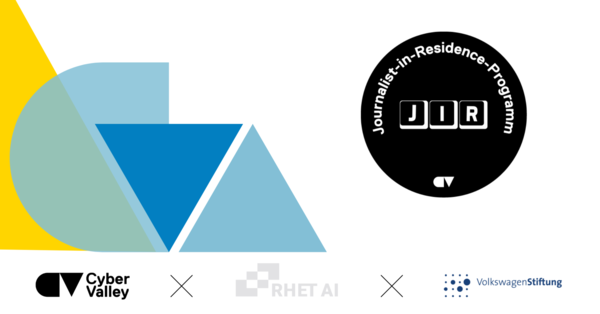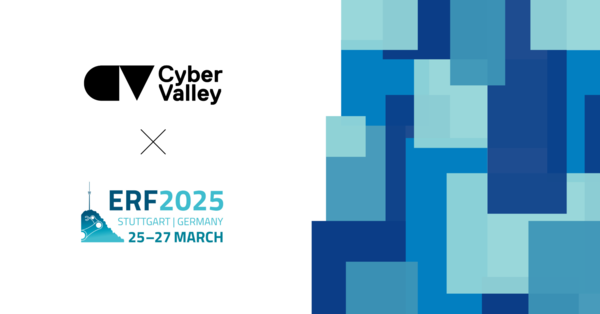“I see myself as a moderator who organizes dialog”
Eight questions for Patrick Klügel, Cyber Valley Public Engagement Manager

The Cyber Valley Public Engagement Program was recently launched with several activities, which aim to make science more accessible by promoting dialog between society and AI researchers. We spoke to Patrick Klügel, Cyber Valley public Engagement Manager, about his role in moderating this dialog.
What is public engagement? What it is about?
“In essence, public engagement means public participation. The term is well known in the US and UK, where universities and research institutions have had well established and professional public engagement activities for many years. The basic idea here is that engagement is always an interactive, two-way process that involves speaking and listening in equal measure. While this may sound simple, it’s not as easy as it seems. Both the general public and the scientific community should benefit from this exchange. Ultimately, Cyber Valley Public Engagement is about creating opportunities for dialog on topics related to the research field of artificial intelligence. We assess and embrace society’s questions and need for knowledge and strive for a constructive, critical, and fact-based dialog with researchers.”
Does that mean that public engagement is ultimately just a slight variation on public and media relations?
“No, it isn’t. Of course, public engagement also involves a great deal of communication, but the focus here is on conversation. More specifically, we aim to give space to a broad range of perspectives. Ideally, something new can emerge from the exchange. This also means that we engage in a process to develop approaches that enable the open interaction I just mentioned. I see myself more as a moderator who organizes and supports this dialog for the benefit of both science and society. That is something fundamentally different from PR in the conventional sense.”
Why is public engagement so important for Cyber Valley?
“For structural reasons, the relationship between the public and science is out of balance. In recent years, however, it has become increasingly clear that both sides depend on each other. Public engagement activities can make a positive contribution here, for instance if our activities lead to more informed exchanges for both sides.
“Artificial intelligence is a very broad field and many people have very different understandings of what AI is. Some ideas and expectations, including fears or even rejection of AI, are well-founded and understandable. Other associations are more reminiscent of Hollywood movies or exaggerated depictions of the technical possibilities. And, as I’ve noticed time and again in the course of my work, many people have only little understanding of the implications of AI in real life.
“In the Cyber Valley research consortium, very different players are cooperating with each other in specific, clearly defined areas. People want to understand the structures and how they work. More importantly, the fields of machine learning, computer vision, and robotics, which are generally summarized as artificial intelligence, may give rise to technologies that can change society. That's why we also need a broad debate beyond academia that is conducted on the basis of good information. We aim to achieve this with our public engagement formats.”
What is Cyber Valley from your perspective as a public engagement manager? What are the Cyber Valley’s goals?
“At its core, Cyber Valley is a research network in which AI scientists from the University of Stuttgart, the University of Tübingen, and the Max Planck Institute for Intelligent Systems conduct free basic research. They are joined by other research partners such as the Fraunhofer-Gesellschaft and seven industry partners. In addition to promoting research, Cyber Valley is also explicitly concerned with training AI specialists. At a Max Planck research school, for example, hundreds of young scientists are studying for their PhDs.
“It also includes promoting a culture of entrepreneurship and innovation. In other words, the contribution to the economy should not only be measured in terms of training specialists, but also in terms of securing or even creating new jobs. There are several ways to do this. It is still rare for researchers to found start-ups. Such spin-offs may pursue commercial purposes or operate without the intention of making a profit. Frequently, young researchers move to industrial companies once they have completed their training. Personally, I find it particularly exciting that Cyber Valley also aims to advance social discourse on the topic of AI.”
The term ‘ecosystem’ comes up quite often in connection with Cyber Valley. What does it mean?
“Many initiatives, institutions, and networks have developed within the Cyber Valley research network. For example, there's the AI Competence Center at the University of Tübingen, as well as the Cluster of Excellence for Machine Learning in Science. Then there is a master’s program in machine learning at the University of Tübingen, the ELLIS European research network, and the AI Progress Center Learning Systems, which is operated jointly with Fraunhofer. In addition, the spin-offs I already mentioned are connected to one another in the Cyber Valley Start-up Network. This AI environment in Stuttgart and Tübingen has become so complex that it can be confusing to people, but it’s what we mean when we talk about the Cyber Valley ecosystem. It is work in progress: a living, breathing project in which many different stakeholders cooperate with and benefit from one another.”
What role do ethical considerations play in AI research?
“They play a very important role, especially in publicly funded science. There is the dual-use issue: simply put, any tool, technology, or invention can in principle be used for both civilian purposes and non-civilian purposes. This also applies to artificial intelligence. For this reason, the allocation of research funds, for example, is very closely observed here. However, because research freedom and independence are secured in Article 5 of the German Basic Law, dual-use poses a challenge that is not easy to solve.
“In the case of the Cyber Valley Research Fund, which is funded by industry partners, a Public Advisory Board (PAB) of independent ethics experts and civil society representatives reviews research proposals closely. This advisory board examines whether a research project might pose problems from an ethical point of view that could have dangerous consequences for society. This diverse advisory board is the first of its kind in public AI research.
“Although AI researchers fundamentally want to and should contribute to the good of society with their research, they sometimes do not see certain risks themselves. They need to be made aware of these risks and trained to recognize them. Dialog with society can help in this regard. Cyber Valley researchers are very interested in engaging in this dialog – and that’s why it’s important that people from very different backgrounds get involved in our projects.”
Related Articles

Exploring Emotional Interactions with AI


